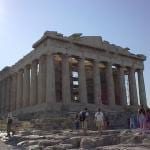For God’s foolishness is wiser than human wisdom, and God’s weakness is stronger than human strength.*
 When confronted with absolute goodness, truth, and beauty, Paul had no time for anything less. This first-rate intellect, product of an epochally excellent Jewish education with at least some Hellenistic reading, had no time for anything less than true wisdom.
When confronted with absolute goodness, truth, and beauty, Paul had no time for anything less. This first-rate intellect, product of an epochally excellent Jewish education with at least some Hellenistic reading, had no time for anything less than true wisdom.
Paul understood that both Jewish and Greek thinkers of his time too often were content with less. They did not aspire for the divine, but merely plausible human thoughts. Naturally none of us can do better than this, we must live with uncertainty, unable to posses the divine wisdom. Our greatest intellectual strength is nothing compared to the pure mathematical beauty, the logical rigor, the poetic wonder, and the music that binds them all together in the Divine Mind.
Revelation shocks us with Christ crucified. Revelation shows us Christ risen and glorified. God become man allows us to see, dimly, the strength of God’s mighty Mind. This humbles us and this humility, the fear of the Lord, is the beginning of wisdom. We can no longer think any of our systems are quite right or our human intellect able fully to grasp the splendor of God’s beautiful Mind.
That much all Christians agree to be true. This is a mighty dose of humility to those of us who like to think, reason, or argue. We are children of God, but only children. This is not bad news put in context. God loves us after all. We must recollect that we never fully “get it.’ There is more, deeper truths, greater beauty, a higher good.
Oddly, however, this very truth has been misused by one type of intellectual: the anti-intellectual intellectual in the Church.
What do I mean? This person is quite willing to point that you, that intellectual over there, knows nothing compared to God’s truth. The power of the Cross makes the wisdom of Plato nothing.
Yes!
Plato himself would have said the divine was beyond human ken! We need to hear this truth. We must aspire to the true light, to genuine wisdom. This wisdom can pierce through our words and allow us to see, live, and love better than we can on our own.
The critic is right.
And yet, for a moment, consider this: the critic too is human. He too has read Paul, understanding the great saint best he could, and then applied the lesson to someone else.
Is he not human?
If so, then he too must have taken the truth and placed it within some system of this world. Perhaps it is what he has been taught in his own little denomination. Maybe he caught some ideas from television or from American culture. As a human, his own understanding, is limited and less than the fierce divine truth in the Cross. The truth, the shattering truth of Jesus, is greater than any philosophy including his own.
The critic of the local “intellectual” is undoubtably right. The critic of that critic is also right. We all have been foolish and fallen short of the strong wisdom of God.
For many, indeed, more education leads to greater humility. There is so much to know and humanity knows so little. I know, relatively, nothing even compared to the totality of human knowledge. What is that compared to the omniscient? True education agrees with the truth that Paul has seen: the weakness of God is stronger than the strength of men.
The problem is not study: understanding the world and Revelation the best one can. The problem is failing to see how small we are compared to the Good, Truth, and Beauty in the Mind of God.
God have mercy on me a sinner.
*I Corinthians 1:25












